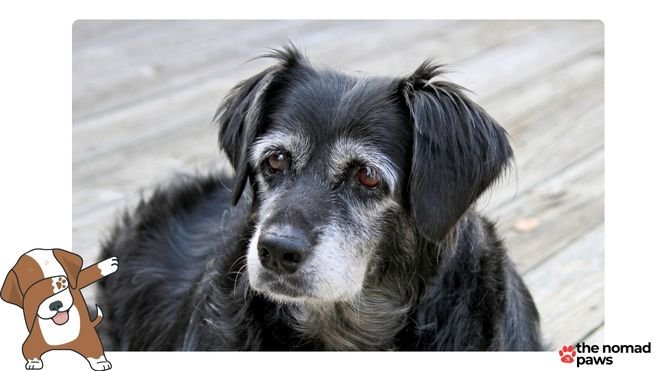You might wonder when your furry friend starts to show grays or moves a bit slower. It raises the question: When is a dog considered a senior?
Recognizing this stage can help you adjust care for their needs.
Dogs reach their senior years at different times, mostly based on size and breed.
For instance, while small dogs might only be considered elderly at 11-12 years old, large breeds can enter their golden years as early as 6-7.
Today, I will try to guide you through understanding canine seniority from identifying aging signs to managing health issues that come with age.
Continue reading, and you’ll learn about the right diet, exercise, and how often to visit the vet for your aging pooch.
By the end of this read, you’ll know exactly how to make your older dog’s life comfortable and happy. Ready to find out more?
The important stuff
- Small dogs are usually seniors at 11-12 years, medium-sized dogs at 10 years, and large or giant breeds by 6-7 years.
- Signs your dog is getting old include less energy, trouble moving, and changes in how they look and act.
- To care for senior dogs, give them the right food, keep them active but don’t overdo it, and take them for health checks often.
- Problems like arthritis, dental issues, and losing sight or hearing can happen as dogs age. Watch out for these signs.
- Dogs are like humans; as they get older, their needs change. It’s important to adjust how you care for them during their senior years.
Defining Senior Dogs
Senior dogs are usually older than seven years. The age can change based on the dog’s breed and size.
Age Ranges for Different Breeds

Understanding when your dog becomes a senior is very important to provide the care they need during their golden years.
Like we have discussed in the guides to the best food for Great Danes and the best food for Dachshunds, different breeds age at different rates, which means the age a dog is considered a senior can vary.
Here’s a simplified breakdown to help you identify when your dog might be entering their senior stage based on their breed size.
| Breed Size | Senior Age Range |
|---|---|
| Small Breeds | 11-12 years |
| Medium-sized Breeds | 10 years |
| Large Breeds | 6-7 years |
| Giant Breeds | 6-7 years |
Dogs reach the equivalent of 60 human years when they are considered senior.
Small dogs are often the exception, not reaching this stage until they are 11-12 years old.
For medium-sized breeds, this transition occurs around 10 years of age. Large and giant breeds age faster, entering their senior years around 6-7 years old.
This information shows the importance of breed size in determining a dog’s life stage.
Keep an eye out for signs of aging, including changes in energy, mobility, and behavior.
These clues, along with understanding the age your dog is considered a senior, can guide you in adjusting their care to suit their aging needs.
Signs Your Dog is Aging
As dogs get older, you may notice changes in their look and behavior. They might move slower or seem less active than before.
Changes in Physical Appearance
As dogs age, you might notice changes in their physical appearance. Their fur may become gray or dull.
Aging dogs can also have skin issues like dryness or lumps. You may see weight gain or loss due to changes in appetite and activity levels.
Appointments with your vet can help track these changes and ensure proper care for your elderly dog.
Regular health check-ups will keep your senior canine healthy and happy during this time of life.
Decreased Energy and Mobility
Changes in physical appearance often lead to decreased energy and mobility in your senior dog.
As dogs age, they may not run or play as much as before. You might notice they tire faster during walks.
Your aging pet may also struggle with jumping or climbing stairs. This can be a sign of arthritis or other health issues common in elderly pets. Changes in behavior and appetite can come along with these shifts too.
Pay close attention to how your mature dog moves and acts daily, as it shows their overall health right now and later on in the aging dog health journey.
Obviously, do keep this in mind if you are planning to go camping with your dog, as your pooch may need a bit of extra rest between walks and play sessions.
Behavioral Changes
Senior dogs often show behavioral changes. These changes can be subtle or noticeable.
A senior dog may become less playful than before. Instead of chasing balls, they might prefer to rest more.
You may also see shifts in their mood. Some dogs get anxious or irritable as they age.
Watch your dog’s appetite too. Changes in eating habits can indicate that your dog is growing older.
They might lose interest in food or eat slower than they used to. When you notice these signs, pay attention and consult your vet about senior dog care options.
Caring for Senior Dogs

Caring for senior dogs requires special attention. Focus on their diet, exercise, and mental activities to keep them healthy and happy.
Proper Diet and Nutrition
A proper diet is key for your aging dog. Good nutrition helps keep them healthy and happy.
- Choose high-quality food. Look for options made for senior dogs. These foods have the right nutrients to support aging dogs.
- Monitor portion sizes. Senior pets often need fewer calories than younger dogs. Adjust their food amount to prevent weight gain.
- Include unique ingredients. Foods with joint support, like glucosamine, can help older dogs with arthritis. This extra care can improve their mobility.
- Keep an eye on water intake. Older dogs may not drink as much water as they should. Make sure fresh water is always available.
- Watch for appetite changes. If your dog eats less, it could be a sign of aging or health problems. Talk to your vet if you notice this change.
- Consider special diets for health issues. Some senior dogs may need special food due to dental issues or other health concerns.
- Offer smaller, easier-to-chew meals if needed. Aging canine teeth can make chewing difficult, so softer options can help them eat comfortably.
- Schedule regular vet check-ups for dietary advice. Your vet knows what’s best for your dog’s specific needs as they age.
Exercise and Mental Stimulation
Senior dogs need regular exercise and mental stimulation. Both are vital to their health and happiness. Here are some tips:
- Short walks keep your dog active. Aim for two or three short walks each day. This helps maintain energy levels as they age.
- Playtime is essential. Engage your dog with games like fetch or tug-of-war. This keeps them both fit and entertained.
- Puzzles can stimulate their minds. Dog puzzles challenge them to think. These can help slow down cognitive decline in older dogs.
- Training sessions are great for mental health. Teach new tricks or reinforce old ones. Doing this stimulates their brains and strengthens your bond.
- Swimming is a low-impact exercise option. It’s easy on joints, especially for dogs with arthritis. Many senior dogs enjoy the water.
- Socialization matters too! Meeting other dogs or people can brighten their day. Arrange playdates for some fun and interaction.
- Adapt activities to their needs as they age. Pay attention to any signs of tiredness or discomfort during playtime.
- Keep a routine for consistency and comfort in daily life.. Senior dogs feel secure with predictability in activities like feeding, walking, and playtime.
- Monitor their weight closely as they age; that’s crucial for senior health management.. Adjust food portions if needed, based on activity levels.
- Regular vet check-ups ensure you catch any issues early on.. Discuss exercise plans with your vet to suit your aging dog’s needs well.
Regular Health Check-Ups
It goes without saying that regular health check-ups are important for your elderly dog.
These visits help catch problems early and keep your pet healthy as they age.
- Schedule Visits: Bring your senior dog to the vet at least once a year. For dogs over 7 years old, twice a year is even better. This helps find any signs of aging early.
- Check Weight: Weight gain or loss can mean health issues. Keep track of your dog’s weight during each visit. Your vet can suggest diet changes if needed.
- Look at Teeth: Dental health matters, especially for senior dogs. Bad teeth can lead to pain and other health problems. Get a dental check-up as part of their routine visits.
- Monitor Mobility: Watch how your dog moves during check-ups. Senior dogs may develop arthritis or other joint issues that affect mobility.
- Test Sensory Abilities: Aging dogs often have declines in vision and hearing. Ask the vet to test these senses routinely to understand your dog’s needs better.
- Blood Tests: Regular blood tests help spot issues like kidney disease or diabetes early on. This is crucial for elderly dogs since some problems can be managed better if caught early.
- Discuss Behavior Changes: Changes in behavior can signal health problems in aging dogs. Talk about any noticeable changes with your vet during visits.
- Vaccination Updates: Make sure all vaccinations are up-to-date, especially as immunity may weaken with age, even when considering geriatric care.
- Plan for Pain Management: Aging dogs may need help with pain management due to conditions like arthritis or dental issues, so discuss treatment options with the vet.
- Stay Informed About Breed Needs: Different breeds age differently, so ask about specific concerns related to your dog’s breed or size during check-ups.
These steps will support both you and your beloved pet throughout the dog aging process as they transition into their senior years.
Common Age-Related Health Problems

As dogs age, they may face problems like arthritis and dental issues. They might also lose some of their senses. These changes can affect their daily life. It’s important to pay attention to these signs.
Arthritis
Arthritis is common in senior dogs. It can cause pain and stiffness in their joints. Many large and giant breeds show signs of arthritis around 6-7 years old. You may notice your dog moving slower or having trouble getting up.
Changes in appetite can also signal this issue. Dogs with arthritis might not want to play as much or go on walks like they used to. Keep an eye out for these changes, especially in aging dogs.
A visit to the vet will help you manage your dog’s health better if you see signs of arthritis in your geriatric dog.
Dental Issues
Senior dogs often face dental issues. As they age, their teeth and gums can weaken. Many dogs develop plaque and tartar buildup. This leads to bad breath and gum disease.
You should keep an eye on your dog’s mouth as they grow older. A change in appetite can signal dental problems. Regular vet check-ups will help catch these issues early.
Good dental care is important for the health of old dogs.
Keeping their teeth clean can improve their quality of life in their senior years.
Decline in Sensory Capabilities
Dental issues can often go hand-in-hand with aging. Dogs also face a decline in sensory capabilities as they grow older. Your dog may lose some of its hearing or sight after reaching senior status around age seven, depending on the breed.
Changes in senses can affect how your dog interacts with the world.
Aging dogs might not hear you call them like they used to. They may seem startled by sudden noises too. Vision problems can make it harder for them to see clearly, especially at night.
You will notice these changes affecting their behavior and mobility over time. Geriatric dogs need extra care to help them adjust during this phase of life.






